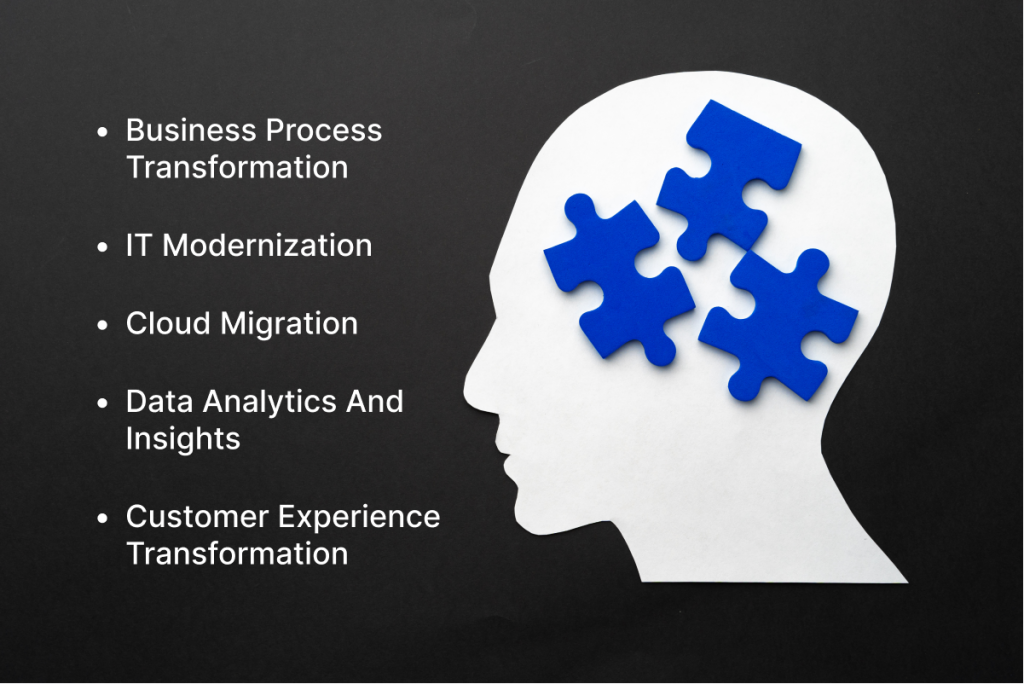Giuseppe Avagliano
Apr 24, 2025 • 7 min read

I. Introduction
78% of global enterprises embed Gen-AI in at least one function, yet only 23% achieve sustained ROI. The differentiator? Leveraging enterprise digital transformation experts who align tech investment with measurable business value. In this article, we illustrate how our experts at Lasting Dynamics have repeatedly delivered measurable outcomes—citing our successful projects like Diagnostic Biochips, Omne by FWD, and ENPACL.
Digital transformation is no longer an option for businesses, it's a necessity. It is driven by the tangible shift in the role of the technology within an organization. With the rapid advancement of technology, companies need to keep up with the times to remain competitive and meet the ever-changing demands of customers. This is where enterprise digital transformation services come in.
Enterprise digital transformation services refer to the process of using digital technologies to fundamentally change the way a business operates and delivers value to customers. It involves the integration of digital technologies into all areas of a business, from customer service to operations and supply chain management.
The importance of enterprise digital transformation services for businesses cannot be overstated. It allows companies to improve operational efficiency, enhance customer experience, and increase agility and scalability. However, the road to digital transformation is not always easy, and businesses may face challenges along the way, such as legacy systems, cultural resistance, and cybersecurity concerns.
Digital transformation is a complex process that involves implementing new technologies, systems, and processes to streamline business operations, enhance customer experiences, and drive growth.
Enterprise digital transformation services are designed to help businesses navigate this process and achieve their digital transformation goals.
The following are some of the key elements of enterprise digital transformation services:

Best practices in enterprise digital transformation services include:

Examples of enterprise digital transformation in practice:
By following these best practices, businesses can successfully navigate the complexities of digital transformation and achieve their goals.
Enterprise digital transformation services can offer a multitude of benefits for businesses. Here are some of the key benefits:

Overall, digital transformation services can help businesses improve their bottom line, create a better customer experience, and stay ahead of the competition.
Proven impact (statistics from Lasting Dynamics projects):
Enterprise digital transformation is a complex process that requires a strategic approach. It is essential to consider key factors when planning and implementing digital transformation services to ensure that the process is successful.
The first step in enterprise digital transformation is defining business objectives and goals. This involves identifying the areas of the business that need improvement and aligning the transformation goals with the overall business strategy. Clear and specific objectives will help in measuring the progress and success of the digital transformation efforts.
Assessing the current systems and infrastructure is another crucial consideration in enterprise digital transformation. This involves evaluating the existing IT infrastructure, software systems, and applications. An assessment will help identify the strengths and weaknesses of the current system and highlight the areas that require modernization and transformation.

It will also ensure that the new systems and applications are compatible with the existing ones and minimize the risks of integration.
Identifying areas for improvement and transformation is also essential in enterprise digital transformation. This involves analyzing the current business processes and identifying areas that need improvement.
For instance, there may be areas of the business where manual processes are still in use, or the data may not be integrated. Identifying these areas will help to streamline the business processes, improve efficiency, and enhance the customer experience.
It is also crucial to build a roadmap for implementation that outlines the steps involved in the transformation process, timelines, and milestones to track progress. Finally, it is essential to ensure that IT and business strategies are aligned, and all transformation efforts meet security and compliance requirements.
Quick actionable recommendations from our experts:
As technology continues to advance, so do the trends in enterprise digital transformation services. One major trend is the adoption of emerging technologies such as artificial intelligence (AI), machine learning (ML), blockchain, and the Internet of Things (IoT). These technologies can provide businesses with new ways to streamline operations, improve decision-making, and enhance customer experience. For example, AI and ML can be used for predictive analytics to anticipate customer needs and optimize business processes.
Another trend is the increasing focus on data privacy and security. As data becomes more valuable and vulnerable, businesses must take steps to ensure that their digital transformation efforts are secure and compliant with regulations. This includes implementing strong cybersecurity measures, ensuring that all data is protected and encrypted, and providing transparency to customers about how their data is being used.
Looking to the future, the role of digital transformation in driving business innovation and growth will only become more critical. As businesses continue to face new challenges and competition, those that are able to innovate and adapt to changing market conditions will be best positioned for success. Digital transformation can provide businesses with the tools and capabilities they need to stay competitive, innovate, and grow.
Emerging trends to watch (2024–2025):

In conclusion, enterprise digital transformation services are crucial for businesses to stay competitive and thrive in today's rapidly evolving digital landscape. By implementing digital transformation strategies, businesses can improve operational efficiency, enhance customer experience, increase agility and scalability, and gain a competitive advantage while saving costs and improving ROI.
However, it is important to carefully consider key factors such as business objectives, current systems and infrastructure, security and compliance, employee buy-in and adoption, and IT-business alignment to ensure successful implementation.
As technology continues to evolve, it is important for businesses to stay up-to-date with emerging trends and future developments in enterprise digital transformation services. Emerging technologies such as AI, IoT, and blockchain have the potential to transform business operations and offer new opportunities for growth and innovation. Digital transformation will play a critical role in driving business innovation and growth in the future.
If you are considering enterprise digital transformation services, it is important to work with a trusted and experienced partner like Lasting Dynamics. Our team of experts can help you develop a tailored digital transformation strategy and provide end-to-end services, from planning and implementation to ongoing support and maintenance. Book a free call with Lasting Dynamics to learn more about how we can help your business achieve digital transformation success.
An expert leads your organization’s full modernization: assessing legacy processes and technology, designing future-proof architecture, prioritizing MVP delivery, upskilling your teams, and embedding sustainable digital capabilities.
Expect 4–6 weeks for initial assessment, 3–6 months for launching an MVP, and 18–24 months for full enterprise-wide rollout, varying by complexity.
Typically, you can expect a 30–40% faster time-to-market, 20–25% operational cost savings, and a 15–20% lift in digital revenue within the first two years.
Budgets generally start around €80–120K for initial discovery and roadmap phases and can range from €1M to €3M for enterprise-wide implementations, depending on scope.
Track deployment frequency, lead-time for changes, customer NPS/CSAT, digital-revenue share, and cloud/infrastructure cost-per-transaction.
Giuseppe Avagliano
Giuseppe is a Marketing expert with 10 years of experience in international media companies and e-commerce. He is passionate about everything that concerns technology, ranging between advertising, smartphones, computers, Cryptos, and NFTs. For sure, there is more coffee than water in his veins but still thinks that calm is the virtue of the strong.